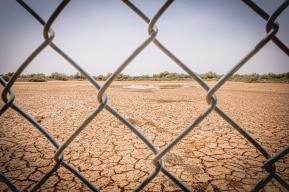مقال
المناخ والعدالة الاجتماعية

حسب النزعة السائدة في النقاش العام حول تغيّر المناخ، تعتبر التكنولوجيات الخضراء الحل المعجزة لكل المعضلات. ولكن كثيرا ما تُهمل نقطة هامة، وهي ضرورة تطويرها بالتوازي مع العدالة الاجتماعية. يقول تياغاراجان جايارامان في هذا الصدد: «ما لم نفهمه بعدُ، وما هو أساسي أن نفهمه، هو أن الأمر لا يتعلّق بالاحترار العالمي فحسب، وإنما باحترار في عالم يفتقد للمساواة والعدل». حسب هذا الخبير الهندي، لا يمكن مكافحة تغيّر المناخ بطريقة فعّالة دون تحقيق المساواة والإنصاف، أي دون سلم وأمان.
تياغاراجان جايارامان يُجيب عن أسئلة شراز سيدهفا
هل يحجب هذا التحمس للتكنولوجيات الخضراء ضرورة التأكيد على المساواة والعدالة الاجتماعية في مكافحة تغير المناخ؟
هذا هو بالذات السؤال الذي يجدر طرحه. فمن الصعب مكافحة أكبر خطر بيئي يُهدّد البشرية دون التطرق لمسألة المساواة والعدالة الاجتماعية، وهو أمر أصبح، في اعتقادي، مقبولا به على نطاق واسع: نحن نميل، بشكل طبيعي، إلى التسليم بأن مكافحة تغيّر المناخ لا بد أن تتمّ بالتوازي مع العدالة الاجتماعية. ولكن مع الأسف، فقدت هذه العبارة جوهرها في الخطاب العادي للمنظمات الدولية التي تتناول أحيانا الموضوع، حتى أننا لم نعد نعرف المعنى الحقيقي للعدالة الاجتماعية. وفعلا، يختلف مغزاها بشكل كبير من ثقافة إلى أخرى.
من وجهة نظري، أرى من بين التعريفات الممكنة للعدالة الاجتماعية تحديدها بوجود نظام حكم أو نظام اجتماعي-اقتصادي من شأنه أن يُؤدّي إلى تثمين القدرات البشرية وتوسيعها وتطويرها.
من الواضح أنه لا يمكننا أن ندّعي إنقاذ البشرية مع القبول بالمظالم الاجتماعية والاقتصادية. والحال أننا نلاحظ وجود نزعة حقيقية لدى عدد من المسؤولين السياسيين – وخاصة منهم المدافعين عن المحيط – إلى التسليم بأن الأول (إنقاذ البشرية) لا بد أن يمر قبل الثاني (المظالم الاجتماعية) باعتبار أهميته القصوى. مثل غلق مصنع مُلوّث قبل الاهتمام بمصير العاملين فيه. وفي هذه الحالة تتجلى مسألة الإنصاف والعدالة بكل معانيها.
كيف يُمكن إذن تفادي السقوط في فخ اللامساواة الاجتماعية مع الاستمرار في تطوير البنى التحتية الخضراء؟
المسألة لا تتعلّق فقط بتطوير البنى التحتية الخضراء، وإنما بكافة أشكال العمل المناخي. وحلها ليس بسيطا: ونكون على خطأ إذا ادّعينا العكس. نسمع حديثا كثيرا عن التكيف أو الهشاشة أو ضرورة الأخذ في الاعتبار، عند التكيف، احتياجات ضعفاء الحال. ونجد تقريبا نفس المصطلحات في الخطاب الذي يدور حول القضاء على الفقر، عندما يتطرق إلى وسائل العيش المستدامة. وكأن هذا الأسلوب الخطابي حقّق الكثير في سبيل القضاء على الفقر... ليس من السهل ضمان العدالة الاجتماعية وفي نفس الوقت مقاومة المناخ. وكما هو الشأن بالنسبة لكافة أجندات التنمية، النضال من أجل عالم عادل ومُنصف هو كفاح طويل المدى، وسوف يتواصل. المهم هو أن نقول بوضوح إن المناخ لا يُمثّل استثناء.
منذ صدور تقرير الهيئة الحكومية الدولية المعنية بتغير المناخ، في أكتوبر 2018، هناك من يحاول إقناعنا بأن عالمنا سيكون مُنصفا بشكل طبيعي إذا لم يتجاوز معدل ارتفاع الحرارة في الأرض 1،5 درجة مئوية. في رأيي، هذا غير صحيح على الإطلاق: إذ لا يمكن الجمع بين العدالة الاجتماعية والمساواة والتنمية، والحفاظ على ارتفاع الحرارة في العالم بمعدل 1،5 درجة مئوية... فكأنما سلمنا بأن كافة مشاكل الظلم مُتأتية من المناخ، وهو طبعا كلام سخيف.
يسعى المسؤولون السياسيون الواعون بمخاطر تغيّر المناخ وتأثيراته إلى حثّ المؤسسات على مساندة الصناعات الخضراء، مؤكدين أنها ستخلق الملايين من مواطن الشغل وإمكانيات جديدة للنمو. هل تدخل العدالة الاجتماعية في هذه المعادلة؟
إلى حد الآن، الاتجاه السائد هو مجاملة المؤسسات أملا في أنها سوف تقوم بما يلزم بخصوص تغيّر المناخ والعدالة الاجتماعية. وهي استراتيجية مآلها الفشل لا محالة.
الدول المتقدمة أمام طريق مسدود بخصوص هذا الموضوع في النقاشات حول المناخ. فهي لم تسجل أي تقدم بشأن الضريبة على الكربون أو تبادل حقوق الانبعاثات. لكن لماذا لم تتمكن من فرض بعض الأهداف على بعض الصناعات؟ لا بد من سن قوانين أكثر صرامة، أو فرض غرامات مالية، وهو أمر ليس مطروحا في الوقت الحالي. والاعتقاد بأنه بالإمكان حثّ المؤسسات، بشيء من التملّق، على التصرّف بشكل أخلاقي، يبدو لي سخيفا نوعا ما. كما لا أرى فيه نفعا لأن المنظومة الاقتصادية تسير بطريقة مختلفة. هناك شركات مثل شال أو إكسون موبايل تتحدّث بلطف عن الاستثمار في التكنولوجيات الخضراء، دون أن تُغيّر شيئا من أنشطتها.
أعتقد أننا بحاجة إلى استراتيجية مزدوجة حول التكنولوجيا في العالم. الجانب الأول يتمثل في إعطاء دفع قوي للانتقال السريع إلى التكنولوجيات الخضراء في الدول المتقدمة، علما وأن هذا الأمر لا يتمّ بالسرعة المطلوبة حاليا. فالعديد من الدول المتقدمة لا زالت، مثلا، تعتزم استعمال الغاز كبديل للفحم – في حين أن كلاهما طاقتان أحفوريتان – بدل اختيار الطاقات المتجددة.
الجانب الثاني من الاستراتيجية يتمثل في ضرورة تجاوز الدول النامية لبعض المراحل، لكن بشكل مدروس ومحكم، إذ لا يمكن أن ننتظر منها المرور مباشرة، دون مرحلة انتقالية، من المحروقات الحيوية على الطريقة القديمة، إلى أحدث تكنولوجيات الطاقة الشمسية. إن انتقال المنظومة الاقتصادية من مستوى معيّن في مجال استعمال الطاقة وجدواها، إلى مستوى مختلف تماما، لا يمكن أن يتمّ بمجرد الإعلان أن «هذا من باب الممكن، والأمر متعلق فقط ببذل الجهود». فالمسألة أكثر تعقيدا من ذلك.
هل الدول المتقدمة على استعداد لمساعدة الدول النامية على تجاوز المراحل حتى تساهم في مقاومة تغيّر المناخ؟
الجهود متفاوتة جدا. عندما تشعر الدول المتقدمة بوجود فرصة ملائمة، فهي لا تفرط فيها وتبقى على استعداد لتوفير تكنولوجياتها للدول النامية، مثل السيارات الكهربائية. ومن ناحية أخرى، هي تطالب بحلول من قبيل «كل شيء أو لا شيء»، وهذا موقف غير مجدي. على سبيل المثال، هي تريد أن تكفّ الهند على الاستثمار في الفحم. من وجهة نظري، بما أن الدول المتقدمة غير قادرة على ضمان الانتقال من الفحم إلى الطاقات المتجددة، وتكتفي في الواقع بالمرور من الفحم إلى الغاز، لماذا تطلب من الدول النامية أن تفعل ما لا تفعله هي؟
لماذا تتباطأ الدول المتقدمة في إصلاح مجال النقل؟ لماذا لا تحث هذه الدول على تطوير النقل بواسطة الكهرباء مثلما تفعله الهند أو الصين؟ توجد في الصين مُدن بأكملها، مثل شانزان، تعتمد على النقل الكهربائي. ولا يوجد مثيل لها في الغرب. وإذا تركنا النقل الكهربائي جنبا، نجد أنه تم تأجيل القواعد الصارمة لضبط الانبعاثات لسنوات عديدة في الاتحاد الأوروبي. لم تحقق الدول المتقدمة إلا القليل في مجال النقل.
وفي العديد من المجالات الأخرى، نلاحظ في النقاشات بين الأخصّائيين، تباينا بين ما يعلنونه من ضرورة الاستعجال وبين السياسات المناخية المعتمدة وطريقة تفعيلها. كما أنهم يُشيرون بكل بوضوح في الوثائق الرسمية للدول المتقدمة، إلى أنهم سيجدون صعوبة كبيرة للوصول إلى الأهداف المحددة لمساهمتهم الوطنية إذا بقيت الوتيرة على حالها. ولكن أصحاب القرار في مجال المناخ لم يظهروا أي تأثر بهذه الملاحظات.
إذا ازداد تغيّر المناخ حدّة، فإن تأثيراته المباشرة وغير المباشرة - زيادة تدفقات الهجرة، مثلا – سوف تلحق الدول الغنية أيضا. فهل تعتقد أن مصالحهم الخاصة، مثل الحد من هذه التدفقات، قد تدفعهم إلى مساندة العدالة الاجتماعية؟
المصلحة الخاصة من صنفين: مصلحة مرتبطة باستقرار النظام العالمي، وأخرى مرتبطة بالبلاد التي ننتمي إليها. لكن مع الأسف، في الولايات المتحدة، الاهتمام بالظروف المعيشية منعدم حتى بالنسبة لداخل البلاد. وحسب دراسة حديثة، فإن ازدياد نسبة الاحترار في المناطق الأكثر ارتفاعا سوف تُؤدّي إلى تكثيف العواصف التي ستصيب بالخصوص كندا، والولايات المتحدة، والاتحاد الأوروبي وروسيا. والحال أن هذه الدول (ربما باستثناء الاتحاد الأوروبي الذي لا ينتمي إلى هذا الصنف) هي التي نادرا ما تعترف بأنه يعود إليها تحقيق الجانب الأكبر من التكيف. ومن الأجدر بها أن تعي بذلك. لأستراليا اليوم ، مثلا، احتياجات ضخمة للتكيف، بالنظر إلى العدد الهائل من الحرائق التي تحدث في الغابات وتُساهم إلى حد كبير في تغيّر المناخ.
يروّج الخطاب السياسي لفكرة مفادها أن التكيف مشكلة تخص العالم الثالث ولا تهم الدول المتقدمة، وهذا أمر مؤسف من وجهة نظري. فإذا قارنّا ارتفاع سطح البحار جراء ارتفاع الحرارة بـ1،5 درجة مئوية و2 درجة مئوية، بالنظر إلى عدد السكان المهددين، يتضح أن الأرقام المطلقة الأكثر ارتفاعا من حيث عدد الأشخاص المعنيين تتعلق بأمريكا الشمالية، وهي أرقام تفوق حتى الدول الجزرية. مع ذلك، تبدو الدول المتقدمة وكأنها غير واعية بأن من مصلحتها الخاصة أن تنشغل بالظروف البيئية للحياة البشرية، في العالم المتقدم على الأقل. أعتقد أن هذا الوعي موجود، إلى حدّ ما، في الاتحاد الأوروبي، رغم أنه لم يؤثر في تغيير السلوكيات بالكامل. أما في بقية العالم، فلا زلنا بعيدين كل البعد عن مثل هذا الوعي.
وظهر تيار فكري جديد ينسب مصدر الصراعات والهجرة إلى الظروف المناخية والبيئية. وعلى ما يبدو، يحاول هذا التيار، ولو جزئيا، تحفيز الشعور بالمصلحة الخاصة في الدول المتقدمة، ولكن من منظور الأمن العالمي. غير أن الحروب والصراعات المسلحة – التي كثيرا ما تكون مصدر الهجرة – هي بالأساس مشاكل نابعة من الظروف السياسية والاجتماعية، وليست فقط ناتجة عن ظروف المناخ. إن تدفق الهجرة بين أفريقيا الشمالية وأوروبا، مثلا، مرتبط وثيق الارتباط بزعزعة الاستقرار وقلب أنظمة الحكم التي كانت تضمن الحد الأدنى من رفاهة العيش، الأمر الذي دفع عشرات الآلاف إلى الفرار. وفي هذا الصدد، ليس هناك أي مبرر لنسب موجات الهجرة إلى تغيّر المناخ.
عالم يأمه السلام والأمن، ذلك هو الشرط المسبق للتصدي لتغيّر المناخ. ولكن القيام بعمل ناجع في مجال المناخ لا يكفي وحده لتحقيق السلام والأمن في العالم.
Interview by Shiraz Sidhva
Does the current push towards green technologies overshadow the need to focus on equality and social justice in the fight against climate change?
This is definitely an issue that needs to be explored. I think there is a general recognition that you could hardly fight what is the most prominent environmental threat to humanity while you ignore issues of equality and social justice. The natural tendency is to argue that fighting climate change must go hand in hand with social justice. Unfortunately, the term social justice gets diluted in the usual international agency-speak in which this subject is sometimes being dealt with, and then you lose a specific understanding of what social justice means – it means very different things to different people.
For me, at least one reading of social justice is having a regime or social economic order that leads to the enhancement, the extension and the development of human capabilities.
Obviously, one cannot speak of saving humanity while talking about tolerating injustices in the social and economic world. But in practice what happens is that there is a tendency in a section of the polity − especially among those who are environmentalists − to argue that the one is so important, that the other has to be put on the back burner. For instance, you shut down factories that are polluting before you worry about what is going to happen to those who are employed there. That kind of issue is where the question of equity and justice becomes really sharp.
So how do you avoid these pitfalls of social inequity while undertaking the development of green infrastructure?
This is not just an issue about the development of green infrastructure, but in all varieties of climate action, and there is no easy solution to it. To pretend otherwise is to fool ourselves. For instance, people talk of adaptation, of vulnerability or dealing with the needs of the vulnerable in a certain way as part of adaptation. This is the same jargon, slightly displaced, that comes from earlier talk about poverty eradication, like sustainable livelihoods. It’s not as if such talk does much to push poverty eradication along. There is no easy route to ensuring social equity as part of climate action. Like all other developmental agendas, the fight for an equitable and just world is an ongoing fight, and it will continue. The important thing is to be very clear that climate is no exception.
There is a tendency, which has become prominent recently, since the publication of the Intergovernmental Panel on Climate Change (IPCC) Special Report on Global Warming of 1.5 ℃, wherein it is sought to be argued that a 1.5 ℃ world is naturally equitable. I think this is completely bogus − it’s not as if you can completely conflate social justice, equity and development with keeping the world average temperature increase at 1.5 ℃. This amounts to saying that all problems of injustice are environmental in origin, which is obviously an absurd statement.
Politicians who are aware of the threat of climate change and its scope have been trying to get businesses to back green industries, saying they will create millions of new jobs and fresh opportunities for growth. Is social justice a part of this equation?
So far, there has been a tendency to mollycoddle businesses and hope that they will do right by climate change and social justice. But this is a strategy doomed to failure.
Developed countries have reached a stalemate on this in climate talks. They go back and forth on carbon taxes, on carbon trading, but why can’t they mandate certain targets to be reached by certain industries? There have to be tighter regulations. Otherwise they should be made to pay the penalty, and that hardly seems to be on the agenda. To believe that somehow you can sweet-talk businesses into acting morally, or scare them into taking the right steps, seems to me a little absurd. I don’t think it’s a very useful point of view either – economics doesn’t work like that. Companies like Shell and ExxonMobil make polite noises about investing in green technologies, and then continue their business as usual.
I think that you need a two-pronged strategy on technology for the world: in developed countries, push very hard to convert rapidly to green technologies, which is not happening fast enough. For instance, many developed countries are still thinking of substituting gas for coal − both are fossil fuels − instead of going for renewables.
The other leg of the strategy is that developing countries must leapfrog in moderate amounts. This has to be done in a sensible way. They cannot be expected to leapfrog from centuries-old biomass burning to state-of-the-art solar power. To move an economy from one level of energy use and efficiency to a completely different level is not simply a matter of saying, ‘If you try hard enough, it can be done’. It’s more complicated than that.
Are the developed countries willing to help out to achieve this leapfrogging of developing countries to help fight climate change?
The effort is very patchy. Where developed countries sense opportunities, they are keen to bring their technologies to developing countries, as in electric vehicles. The other problem is that they want all-or-nothing solutions, which will not work. For instance, they want India not to invest in coal. My point is, when developed countries are unable to implement the coal-to-renewables transition, and in effect doing only coal-to-gas, why are they asking developing countries to do this?
Why are developed countries so slow in reforming the transport sector? Why is there not a push for electric mobility in developed countries, comparable to the push that is happening in countries like India and China? China has entire cities, like Shenzhen, which are run on electric transport. There’s nothing of the kind in the West. Forget electric mobility – even the most stringent norms on emissions have been deferred for a few more years in the European Union. Transport is a sector where developed countries have been getting away with doing very little.
In a wide variety of other sectors, the urgency which emerges in the talks of climate scientists is not reflected in policy and real climate action. Even in the official documents of the developed countries themselves, they are clear they will be hard-put to meet their Nationally Determined Contributions (NDC) targets at the rate at which they are moving today. There is hardly any real furore over this in climate policy circles.
If climate change escalates, the consequences and indirect consequences − an increase in migration, for example − will also affect the wealthy countries. Do you think self-interest – like mitigating migration − can motivate wealthy countries to support social justice?
There are two kinds of self-interest: one is the self-interest in a stable global order, and the other is self-interest in one’s own country. But when it comes to the US, unfortunately there is not even self-interest with regard to the conditions of life in the US itself. A recent study has suggested that the higher rate of warming in the higher latitudes will create a lot of extra storm activity and this especially refers to Canada, the US, the EU and Russia. These are the countries − except perhaps for the EU, which is not in the same league − that hardly discuss their own countries as the sites of the most demanding adaptation requirements, when in fact they should be doing so. Australia is now a huge burden of adaptation − all those forest fires contribute a lot to climate change.
This idea that adaptation is a problem of the third world – and not of their own (developed) countries – which has gained ground in some of the policy discourse, is, I think, unfortunate. In fact, if you compare sea-level rise at 1.5 ℃ to that at 2 ℃ – in terms of the number of people affected by it, North America has the highest absolute numbers of people who will be affected, even more than the island states. The idea that self-interest should make them worry about the environmental conditions of human life in the developed world itself, is not quite there. It has come home, to some extent I believe, in Europe, though it doesn’t seem to affect all their behaviour. But I think in many other places, this realization has not really sunk in.
There is this new wave of thinking which attributes all migration and conflicts to climate or environmental conditions. Some of it seems to be an effort to awaken the self-interest of developed countries, but from the global security perspective. But war or armed conflicts – which have a lot to do with migration – are very much problems of social and political conditions and are not simply climate-driven. For instance, the North African migration to Europe has a great deal to do with the huge destabilization and overthrow of regimes that provided some basic welfare, so obviously people are fleeing in the tens of thousands. The conflation of this with the impact of climate change is quite unwarranted.
A peaceful and secure world is a precondition for dealing effectively with climate change. But that does not mean peace and security will arise because you take effective climate action.
Thiagarajan Jayaraman
An Indian academic who has focused on climate action and climate justice for more than a decade, Thiagarajan Jayaraman is a professor at the School of Habitat Studies at the Tata Institute of Social Sciences, Mumbai, India. He is also a member of the Planning Board of the government of Kerala state and has worked with the Government of India on climate policy issues.











